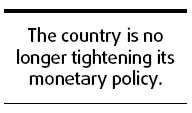Monetary stimulus
Monday's announcement by the People's Bank of China (PBOC) signals an important change. The country is no longer tightening its monetary policy.
And it is about time, since China has gradually increased its efforts to prevent inflation for many years. In fact, Monday was the first time since 2002 that the central bank cut the cost of bank loans, and the first time in nine years that it reduced the proportion of money that lenders must have in reserve.
Although they must have been planned beforehand, these measures coincided with the turmoil on Wall Street led by the collapse of Lehman Brothers, and may appear to be an emergency reaction to the global alarm.
But the PBOC announcement did not seem to take immediate effect because it came at the same time as the gloomy news about global financial market woes. China was not spared.
On Tuesday, China's stock market (closed for holiday on Monday) also dropped, after the benchmark Shanghai Composite Index had already fallen 60 percent this year. The continuing decline in the Chinese market showed that the good news at home, namely the PBOC announcement, failed to mitigate the bad news from abroad.

That may be the case for the time being. But as indicated by the PBOC announcement, the monetary stimulus that may be on its way is by no means insignificant in the long run. Faced with sluggish domestic growth and increasing global uncertainties, the Chinese business community and investors are in dire need of good news.
Not just good news, but also good moves are needed to help the country cope with the new threat. The primary new threat now is not the economy over-heating, but its slowing down.
Government figures in August showed weakening industrial output and falling imports, common symptoms of an economy that is losing its vigor and vitality. In the meantime, the narrowing of profit margins is hurting enterprises in many industries.
Inflation, which looked quite dangerous in the earlier months of this year, appears to be no longer running wild. The national consumer price index fell to 4.9 percent last month, its lowest level in 14 months, after peaking at a 12-year high of 8.7 percent in February.
Now, by cutting the required reserve rate for small banks, the PBOC can provide a timely boost to banks lending to small- and medium-sized enterprises (SMEs) in particular. The SMEs used to be the most dynamic players in the economy but have suffered the most from the tightening credit line.
The PBOC announcement on Monday should lead to a series of monetary policies to sustain SMEs and thereby restore the economy's competitive edge.
At the moment, when financial turmoil and sluggish demand overseas have darkened the prospects for China's exports, a monetary stimulus package should be put together as soon as possible for worthy domestic projects.
(China Daily 09/17/2008 page8)














